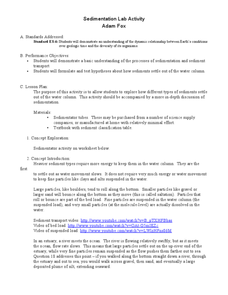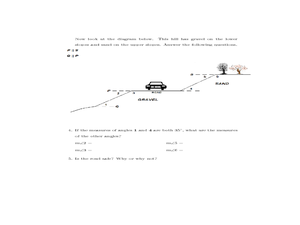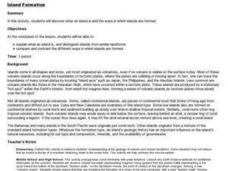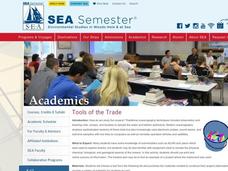Curated OER
Sedimentation Lab Activity
Learners predict how sediments in a water column will settle. In this earth science lesson, students examine the layers of sedimentation. Learners are given sediments to place into a column of water and observe how they settle....
Curated OER
Sediment Deposition Lab
Students set up a stream table, observe erosion, and record data on where various sizes of sediments settle. They draw conclusions as to what kind of sedimentary rock form in what locations.
Curated OER
HOW FAST DO SEDIMENT GRAINS OF DIFFERENT SIZES SETTLE?
Students conduct an experiment using sand, a jar, and a paper clip to analyze the effects of different kinds of sand vis a vis its sediment. They graph their findings and analyze for factors of size, shape, and density.
Curated OER
"What If The Earth Were Made Of Sand
High schoolers examine the most common characteristics of clay and sand, and to understand how the properties of these materials affect the erosion of the landscape and the formation of the many landforms. They explore clay and sand...
Curated OER
Fossil Fuels (Part III), The Geology of Coal
Do not overlook this set of lessons just because your school does not have a data analysis system. There is plenty of material here to administer a complete mini unit on the formation, distribution, and properties of coal. Since it...
Curated OER
Hudson Canyon Expedition Let's Bet on Sediments!
Students investigate and analyze the patterns of sedimentation in the Hudson Canyon students observe how heavier particles sink faster than finer particles. They study that submarine landslides (trench slope failure) are
Curated OER
A Model of the Rock Cycle
In this rock cycle worksheet, students use different colored crayons to represent different types of rocks. They follow step by step procedures to model the rock cycle with the crayons. Students draw the rock cycle, show weathering,...
Curated OER
Particle Size and Oil Production
Students investigate how permeable different materials are. In this physics lesson, students determine what affects permeability and how permeability relates to oil production.
Curated OER
The Tipping Point
Students rewrite word problems and solve using math. In this word problem lesson, students gather data and observe the data. They relate this process to the scientific method and math. They review their data to be able to answer...
Curated OER
Using Magnetotactic Bacteria to Study Natural Selection
Young scholars observe bacteria that are able to orient themselves using the Earth's magnetic field.They comprehend the difference between anaerobic and aerobic organisms. Students can tell the difference of the shape of magnetic force...
Curated OER
Fossil Fuels (III), The Geology of Coal: Interpreting Geologic History
Learners hypothesize about why various samples of coal have different characteristics. Pupils use information that they found during Internet searches to ascertain the validity of their hypotheses and verify the "story" of coal. ...
Curated OER
Layers Upon Layers - Lesson Plan
Students study rock layers and the sequence of events that occur when a canyon forms. In this sedimentary lesson students complete a lab while in groups and discuss what happens.
Curated OER
How Does Flowing Water Shape a Planet's Surface?
Students investigate how flowing water influence landforms. In this earth science lesson, students observe water behavior as it flows from the stream table at various inclinations. They discuss whether water shaped Mars landforms or not.
Curated OER
Stream Watch
Students discuss why it is important to take care of streams, what is non-point source and point source pollution, what are some causes of pollution in streams, and what can we do to prevent some of these causes of pollution? They steam...
Curated OER
Using Magnetotactic Bacteria to Study Natural Selection
High schoolers demonstrate that living organisms may possess incredible adaptations which enable them to survive. They observe bacteria that are able to orient themselves using the Earth's magnetic field and formulate a hypothesis as to...
Curated OER
It's Sedimentary, My Dear!
Students examine sedimentary rocks to determine how they form. In this Earth science lesson plan, students will make a rock by cementing small particles together. The students will then compare their observations of sedimentary rocks to...
Curated OER
Island Formation
Students create models of how islands are formed by hot spots and then write a summary of their observations and of how they think their model relates to volcanic hot spots and island formation.
Curated OER
Identifying Wetlands
Young scholars describe three major categories of indicators that are used to delineate wetlands. For this wetlands lesson students visit a wetland and make observations then complete an activity using the soil.
Curated OER
Tools of the Trade
Young scholars construct functional replicas of oceanographic tools and demonstrate and explain their use.
Howard Hughes Medical Institute
The Day the Mesozoic Died
While this is not the traditional, step-by-step lesson plan, it is chock-full of material that you can easily incorporate into your earth history unit. Its main purpose is to serve as a guide to using a three-part film, The Day the...
NOAA
Ocean Zones
How can organisms light up in water? Bioluminescence is light produced in a chemical reaction that can occur in an organism's body. First, learners determine what happens to light/color as you move into the deep ocean. In groups, they...
Curated OER
Salt Marsh in a Pan
Students create a model of a salt marsh to discover the impact of pollution and human activities on water-based habitats including bays and the ocean. They recognize the relationship between natural and developed areas. Students impact...
Curated OER
Let's Take a Rock Apart!
Students examine a crushed rock and sort the minerals they find in that rock by color and other properties.
Curated OER
Winogradsky in a Bottle: Beginning a Winogradsky Column
Students use their measurement skills by marking a bottle for construction purposes. They record qualitative and quantitative data and analyze their results. Students demonstrate evaluation of a small scale systems as a model for the...

























